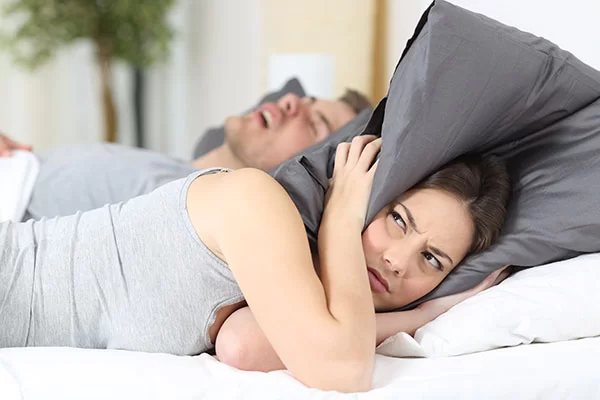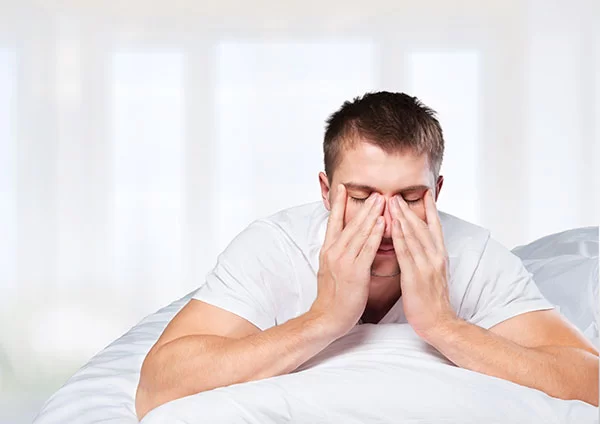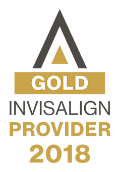Is Your Snoring an Indicator of Sleep Apnea?
Is your snoring just a nuisance, or could it be a sign of a more serious condition like sleep apnea? Sleep is vital for your health, and disruptions like snoring or sleep apnea can significantly impact your well-being. If you’re in Tacoma, WA, or surrounding areas like Lakewood, Puyallup, or Gig Harbor, understanding the difference between snoring and sleep apnea is the first step toward better sleep and improved health.
Our Tacoma-based dentist is here to help you navigate these common sleep issues. Let’s dive into the latest information on sleep apnea vs. snoring, including symptoms, causes, and treatment options tailored to our local community.

What Is Snoring?
Snoring is the harsh sound produced when airflow causes the soft tissues in your throat (like the soft palate and throat muscles) to vibrate during sleep. While snoring is often harmless, it can sometimes indicate an underlying issue like obstructive sleep apnea (OSA).
Common Causes of Snoring:
- Nasal congestion or nasal obstruction (e.g., from a deviated septum)
- Obesity or weight gain, which narrows the upper airway
- Alcohol use or sedatives that relax throat muscles
- Sleeping position (back sleeping often worsens snoring)
- Enlarged tonsils or large tonsils (common in children)
While snoring can disrupt your bed partner and lead to poor sleep quality, it’s not always a sign of a sleep disorder. However, if your snoring is loud and persistent, it’s worth exploring further to rule out sleep apnea.
What Is Sleep Apnea?
Sleep apnea is a serious sleep disorder where breathing repeatedly stops during sleep. These breathing pauses can last seconds to minutes and occur dozens of times per night, leading to an increased risk of health problems like heart disease, atrial fibrillation, and congestive heart failure.
There are two main types of sleep apnea:
- Obstructive Sleep Apnea (OSA): The most common form, caused by the relaxation of throat muscles and soft tissue, leading to airway obstruction.
- Central Sleep Apnea (CSA): A less common type where the brain fails to send proper signals to the breathing muscles.
Sleep Apnea Symptoms:
- Loud snoring (often reported by a bed partner)
- Breathing pauses or gasping during sleep
- Excessive daytime sleepiness
- Morning headaches or dry mouth
- Trouble concentrating or irritability
If you’re experiencing these symptoms, it’s crucial to seek a proper diagnosis through a sleep study (polysomnography). Early detection can prevent long-term health conditions and improve your quality of life.

Key Differences Between Snoring and Sleep Apnea
While snoring and sleep apnea both involve the upper airway, they differ in severity and consequences. Here’s a breakdown:
- Nature: Snoring is loud breathing caused by vibrations in the throat tissues. Sleep apnea, on the other hand, involves repeated pauses in breathing, either due to blocked airways (obstructive sleep apnea) or a lack of brain signals to breathe (central sleep apnea).
- Health Risks: Snoring can disrupt sleep but is usually harmless. Sleep apnea, however, may cause serious health problems like heart disease, high blood pressure, and congestive heart failure.
- Diagnosis: Doctors typically diagnose snoring through symptoms or a physical exam. If sleep apnea is suspected, a sleep study (polysomnography) may be recommended to evaluate breathing patterns, oxygen levels, and brain activity.
- Treatment: Snoring can often be managed with lifestyle changes like weight loss and avoiding alcohol, along with mouthpieces or nasal strips. For sleep apnea, treatments include CPAP therapy, oral appliances, lifestyle modifications, or surgery in severe cases.
- Symptoms: Snoring is loud, disruptive breathing during sleep, while sleep apnea symptoms include loud snoring, breathing pauses, gasping for air, daytime sleepiness, morning headaches, and trouble concentrating.
Diagnosis and Treatment Options in Tacoma, WA
Sleep Apnea Treatment
A sleep study monitors your oxygen levels, breathing patterns, and brain activity to diagnose sleep apnea.
Treatment options for sleep apnea can include:
- Continuous Positive Airway Pressure (CPAP): The gold standard for treating obstructive sleep apnea.
- Oral Appliances: Custom-fit devices, like SomnoDent, keep your airway open by adjusting your tongue position or jaw.
- Lifestyle Changes: Weight loss, avoiding alcohol, and positional therapy can reduce symptoms.
- Surgery: For severe cases, procedures like neck surgery or tonsil removal may be recommended.
Snoring Treatment
Diagnosing snoring is often based on symptoms, but a sleep study may be needed to rule out sleep apnea.
Treatment options for snoring include:
- Lifestyle Modifications: Weight loss, reducing alcohol use, and changing sleep positions.
- Snoring Mouthpieces: Devices that prevent soft tissue vibration.
- Nasal Strips or Sprays: Help alleviate nasal congestion and improve airflow.
Frequently Asked Questions
Can snoring lead to sleep apnea?
While snoring itself doesn’t cause sleep apnea, it can be a common symptom of obstructive sleep apnea. Loud, persistent snoring should be evaluated by a healthcare professional.
Are there natural remedies for snoring?
Yes! Weight loss, sleeping on your side, and using saline sprays for nasal congestion can help reduce snoring.
Can children have sleep apnea?
Absolutely. Pediatric sleep apnea is often caused by enlarged tonsils or adenoids and requires prompt treatment to prevent developmental issues.
Know When to Seek Help in Tacoma, WA
If you or a loved one snores loudly, experiences breathing pauses, or feels excessively tired during the day, it’s time to seek a sleep apnea evaluation. Early intervention can prevent serious health problems and improve your quality of life.
Our Tacoma dental office proudly serves patients in Lakewood, Puyallup, Federal Way, Gig Harbor, and University Place. Contact us today at (253) 761-5422 to schedule your consultation and take the first step toward better sleep.





















